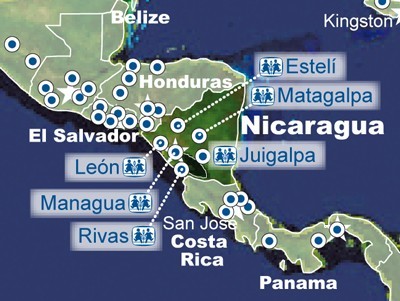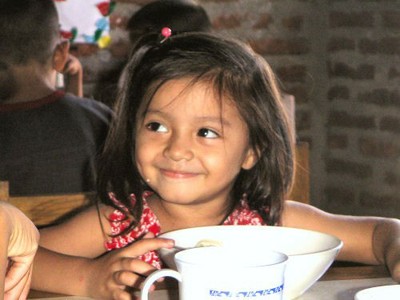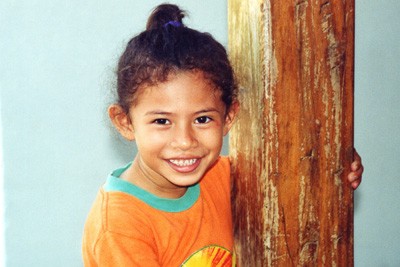SOS Children in Nicaragua
 Overview of Nicaragua
Overview of Nicaragua
Nicaragua in Central America is the third poorest country in the Americas. Poverty affects 2.3 million people, a third of whom live in extreme poverty, mainly in the Central and Atlantic regions.
One in every three children has some degree of chronic malnutrition and nine per cent suffer from severe malnutrition. Safe water and sanitation coverage remains low, particularly in rural areas and those with dispersed populations.
The economy, which was devastated during the 1980s by civil war, experienced a sharp growth in the 1990s but suffered another catastrophic blow in 1998 when Hurricane Mitch hit central Nicaragua. Over half the season's crops were destroyed and over 50 per cent of the country's lifestock lost, with agricultural land not expected to recover for at least five years.
Our Work in Nicaragua
We began working in Nicaragua in 1973 following the earthquake which destroyed the capital of Managua. We built a community in Esteli in north-west Nicaragua about 150 km from the capital. There are now six SOS Children's Villages, as well as numerous social welfare and educational projects which also benefit local communities.
 Esteli
Esteli
The Esteli Village has 12 family houses. There is also an SOS Nursery, a clinic, SOS Primary and Secondary Schools, SOS Youth Homes for the older children and an SOS Vocational Training Centre with courses in carpentry, dressmaking, baking, etc. By teaching in shifts, the schools can accommodate over 1200 pupils. A small farm provides most of the needs of the community. Esteli also has several SOS Social Centres, where local working mothers, mostly single, can leave their children during the day. At these centres, hundreds of children are given three meals a day and medical care. The care provided by these SOS Social Centres is a fundamental part of SOS Children's work in Nicaragua.
Juigalpa
We built a second Nicaraguan Village in 1979, to the west of Juigalpa, about 138 km north east of Managua. SOS Children's Village Juigalpa has ten family houses and an SOS Nursery, as well as a child day care centre similar to Esteli, for children of single mothers in the vicinity. We set up an SOS Medical Centre which provides treatment for children from the Village and the local community.
Managua
We completed a third Village at Managua in 1995. Situated in an attractive residential area in the north-west of the capital, it has 12 family houses built in the local style. Adjoining the Village and providing facilities for neighbourhood families as well as the SOS children are an SOS Nursery, a day care centre and an SOS Medical Centre. An SOS Primary and Secondary School were opened in 1999, with children in the primary school being taught in shifts.
Matagalpa
SOS Children's Village Matagalpa opened in 2000. It is in central Nicaragua, in an area which was badly affected by Hurricane Mitch in 1998. The community consists of ten family houses, which provide a home for up to one hundred children, a house for the community Director, a guesthouse and an administrative building with a all-purpose community room. The SOS Social Centre includes a day care centre, a nursery, a library, classrooms for different workshops (computer, cosmetics, tailoring), a paediatric medical care centre and a dental practice.
 Leon
Leon
Following the devastation caused by Hurricane Mitch in 1998, an emergency relief programme was set up in Leon. There is now an SOS Children’s Village at Leon which opened in 2004. There are a number family homes and a social centre, which provides child day-care and training workshops for the local community.
Rivas
A sixth SOS Children's Village opened in Rivas in 2007. There are 14 family homes for 126 orphaned and abandoned children.
Life in SOS Children's Villages Nicaragua: Personal experiences
Lively teenagers from SOS Children's Village Leon discuss the subject of personal experiences and relationships with regard to successful learning within the home and at school.
What have you learnt in your SOS family?
'I've learnt many things. My SOS mother has taught me to be kind, amicable, supportive and to be nice to people. I have seen how she interacts with my brothers and sisters and with others, and how she expresses her feelings and her needs. I really admire her! I have also learnt to work as a team, as we all work together to ensure greater harmony at home.'
How have you learnt the values necessary to ensure greater harmony?
'I've learnt them in many ways, through integrating into my family's life and taking part in the daily household activities, because we all observe each other and, as such, are able to help each other out. I have learnt from the example my SOS mother sets and the advice she gives me. I have also learnt from the things I've done well and from my mistakes.'
How has your own learning experience been?
'Because my mother Eugenia helps me, it has been positive and at times easy. I feel that she helps me to think for myself and I can talk to her without feeling stifled because she tries to respect my decisions. This gives me greater confidence.'
What has been the hardest part for you in learning to live together in harmony?
'Well, because I have quite a strong character, sometimes the hardest thing has been accepting limits. This is because I don't feel that I can do what I want and sometimes think that my SOS mother should accept that I've grown up. However, when I discuss it with her, she talks about the importance of behaving responsibly and sensibly. The way in which she encourages me to be more tolerant makes me feel loved and protected, and this gives me the confidence to know what I should and shouldn't do.'
Do you think that creating values and rules is important for your life?
'Yes, it is important because it helps me to develop as a person and, thanks to my upbringing, I've been able to react well to the experiences I've had. I feel that I can be more confident, that my relationships have improved and that I've gained trust and respect from my family, friends and classmates.'
Local Contact
Apartado Postal 3717Managua
Nicaragua
Tel: +505/22/70 08 79, +505/22/78 06 86, +505/22/78 64 14, +505/22/78 64 16
Fax: +505/22780686107
e-mail: sosnica@aldeasos.org.ni

 Return to Schools Wikipedia Home page…
Return to Schools Wikipedia Home page…
